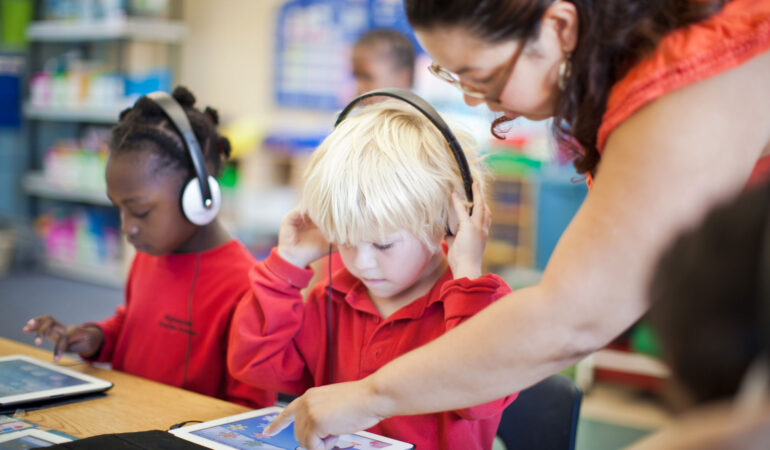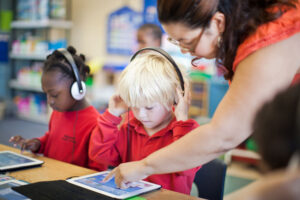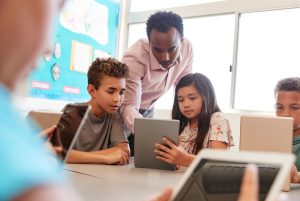
Enhancing Language Learning through ICT
Course Description
This course aims to teach educators how to enhance language learning through Information and Communication Technologies (ICT). In an era where technology is rapidly expanding its role in education, this course focuses on how to integrate digital tools into the language learning process to boost student motivation and language proficiency. Aligned with the 2021-2027 Erasmus+ Programme’s focus on digital transformation, the course will present innovative and creative methods for language teaching.
Educators will gain practical skills in integrating digital tools, e-learning platforms, and mobile applications into their language teaching practices, providing their students with richer learning experiences.
Course Methodology
The course is based on an activity-based, hands-on, and collaborative methodology. Educators will first learn the theoretical aspects of how ICT can be integrated into language teaching and will then engage in classroom applications using various digital tools and methods. Each day, participants will have the opportunity to develop their skills through group work, individual projects, and technology-supported activities. The course is designed to ensure that participants can easily transfer their learning into their own teaching environments.
Course Objectives
- Teach educators how to use ICT tools in language learning.
- Support language learning through digital platforms, mobile apps, and online resources.
- Integrate e-learning and blended learning strategies into language teaching.
- Develop language teaching programs aligned with digital transformation and inclusivity priorities.
Learning Outcomes
- Participants will have learned how to enrich language learning processes using digital tools and online platforms.
- Participants will be able to create ICT-supported lesson plans and improve language teaching processes.
- Participants will be able to integrate e-learning and blended learning methods into language teaching.
- Participants will understand how to incorporate Erasmus+’s digital transformation priorities into their language teaching practices.
Tentative Daily Programme
Day 1: ICT and Language Learning: Key Concepts
- Icebreaker Activity: “Sharing Experiences with Technology and Language Learning” – Participants share their experiences with technology and language learning in their classrooms.
- Using ICT in Language Learning – How ICT can be used in language learning and its impact on student success.
- Effective Digital Tools for Language Teaching – Tools like Duolingo, Quizlet, and Memrise for language teaching.
- Project Simulation: Creating a Lesson Plan with Digital Tools – Participants design an innovative language lesson plan using digital tools.
Day 2: Blended and E-Learning Strategies
- Warm-up Activity: “Getting to Know New Tools” – Participants explore a digital tool they have never used before and discuss how they could integrate it into language teaching.
- Blended Learning: Combining Digital Tools with Face-to-Face Learning – How to integrate digital tools into face-to-face teaching in the blended learning model.
- E-Learning Strategies for Language Teaching – Practical work on using e-learning platforms and language learning software.
- Project Presentations and Feedback
Day 3: Enhancing Language Teaching with Mobile Applications
- Warm-up Activity: “Best Practices” – Participants share the best mobile language learning apps they use in their classrooms or personal experiences.
- Language Learning with Mobile Apps – How to use apps like Babbel, HelloTalk, and Lingoda in language teaching.
- Mobile Technology and Language Learning Activities – Games and activities for language learning using mobile devices.
- Project Presentations and Feedback
Day 4: Interaction and Collaboration in Digital Environments
- Warm-up Activity: “Digital Collaboration Experience” – Participants work on a short task using digital collaboration tools such as Padlet or Google Classroom.
- Enhancing Language Learning through Out-of-Class Interaction – Using digital platforms like Zoom and Skype to increase out-of-class language interactions.
- Group Work in Digital Environments – Practical applications of group work using online collaboration tools to support language learning.
- Group Project Presentations and Feedback
Day 5: Course Evaluation and Certification Ceremony
- Course Evaluation – Participants reflect on their learning and discuss collaboration opportunities.
- Collaboration Opportunities for Future Digital Language Learning Projects – Participants discuss collaboration opportunities for Erasmus+ projects focused on digital language learning.
- Certification Ceremony and Course Cake Cutting
- Cultural Excursion Support
At the End of the Course
- Participants will receive their certificates.
- Participants will provide a general evaluation of the course and complete the event survey.
- Participants will receive course materials, videos, photos, and PDF documents in both digital and print formats.
Follow-up and Support
After the course, participants will be provided with digital and printed materials. An email group will be created to facilitate ongoing collaboration and the sharing of ideas related to digital language teaching projects.
*Please note that course activities and content may vary depending on participants’ preferences and the instructor leading the session. Any changes to the course are at the discretion of the instructor. If there is a specific topic you would like to include in the course content, please let us know in advance.
Course Info
- Duration: 5 Days
- Location: All Location
- Cost: € 80-Day
- Certificate: Yes
- Prerequisites: No











